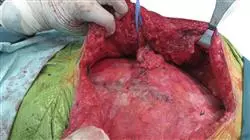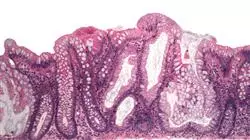University certificate
The world's largest faculty of medicine”
Introduction to the Program
Get up to date with the latest diagnostic techniques in Digestive Oncology through this Advanced master’s degree, which will provide you with the most recent advances in the approach to this type of pathology"

In recent years, there has been a significant advance in the understanding of the molecular biology of digestive oncological diseases, which has led to a better understanding of the molecular pathways involved in digestive cancer, allowing the development of new targeted therapies. Given this scenario, the specialist must keep up to date in order to deal with this type of pathology with the latest diagnostic techniques and procedures.
In this context, the Advanced master’s degree in Comprehensive Gastrointestinal Oncology is presented as advanced training for medical professionals who wish to update their knowledge and skills in the field. The program includes fundamental aspects of digestive oncology, from the anatomy and physiology of the gastrointestinal tract to the comprehensive management of digestive cancer patients, including the prevention, diagnosis and treatment of digestive pathologies. In addition, topics such as immunotherapy, molecular biology, new imaging techniques and targeted therapies, which are transforming the treatment of digestive cancers, will be addressed.
The methodology of the program is based on a 100% online format, which allows students to access the contents and resources from anywhere in the world, without the need to travel or fixed schedules. The program has a highly prestigious teaching team, with clinical and teaching experience in digestive oncology, which offers practical and up-to-date training, combining theory with practice and offering innovative tools to improve the clinical performance of the medical professional.
Take advantage of the 100% online methodology with which this programme is developed and access its resources from anywhere and at any time, adapting the study to your needs and schedules"
This Advanced master’s degree in Comprehensive Gastrointestinal Oncology contains the most complete and up-to-date scientific program on the market. The most important features include:
- The development of case studies presented by experts in medicine and oncology
- The graphic, schematic, and practical contents with which they are created, provide scientific and practical information on the disciplines that are essential for professional practice
- Practical exercises where self-assessment can be used to improve learning
- Its special emphasis on innovative methodologies in the approach to digestive oncology
- Theoretical lessons, questions to the expert, debate forums on controversial topics, and individual reflection assignments
- Content that is accessible from any fixed or portable device with an Internet connection
Master the latest technologies and surgical techniques in Digestive Oncology and apply them in your daily work thanks to this Advanced master’s degree"
Its teaching staff includes professionals from the field of oncology who bring their experience to this programme, as well as recognised specialists from leading societies and prestigious universities.
The multimedia content, developed with the latest educational technology, will provide the professional with situated and contextual learning, i.e., a simulated environment that will provide an immersive learning experience designed to prepare for real-life situations.
This program is designed around Problem-Based Learning, whereby the student must try to solve the different professional practice situations that arise throughout the program. For this purpose, the professional will be assisted by an innovative system of interactive videos made by renowned experts.
This program has numerous multimedia resources, such as detailed videos, interactive summaries, interactive in detail, interactive summaries and clinical case studies"

This TECH qualification is taught by highly prestigious specialists in the field of Digestive Oncology"
Why study at TECH?
TECH is the world’s largest online university. With an impressive catalog of more than 14,000 university programs available in 11 languages, it is positioned as a leader in employability, with a 99% job placement rate. In addition, it relies on an enormous faculty of more than 6,000 professors of the highest international renown.

Study at the world's largest online university and guarantee your professional success. The future starts at TECH”
The world’s best online university according to FORBES
The prestigious Forbes magazine, specialized in business and finance, has highlighted TECH as “the world's best online university” This is what they have recently stated in an article in their digital edition in which they echo the success story of this institution, “thanks to the academic offer it provides, the selection of its teaching staff, and an innovative learning method aimed at educating the professionals of the future”
A revolutionary study method, a cutting-edge faculty and a practical focus: the key to TECH's success.
The most complete study plans on the university scene
TECH offers the most complete study plans on the university scene, with syllabuses that cover fundamental concepts and, at the same time, the main scientific advances in their specific scientific areas. In addition, these programs are continuously being updated to guarantee students the academic vanguard and the most in-demand professional skills. In this way, the university's qualifications provide its graduates with a significant advantage to propel their careers to success.
TECH offers the most comprehensive and intensive study plans on the current university scene.
A world-class teaching staff
TECH's teaching staff is made up of more than 6,000 professors with the highest international recognition. Professors, researchers and top executives of multinational companies, including Isaiah Covington, performance coach of the Boston Celtics; Magda Romanska, principal investigator at Harvard MetaLAB; Ignacio Wistumba, chairman of the department of translational molecular pathology at MD Anderson Cancer Center; and D.W. Pine, creative director of TIME magazine, among others.
Internationally renowned experts, specialized in different branches of Health, Technology, Communication and Business, form part of the TECH faculty.
A unique learning method
TECH is the first university to use Relearning in all its programs. It is the best online learning methodology, accredited with international teaching quality certifications, provided by prestigious educational agencies. In addition, this disruptive educational model is complemented with the “Case Method”, thereby setting up a unique online teaching strategy. Innovative teaching resources are also implemented, including detailed videos, infographics and interactive summaries.
TECH combines Relearning and the Case Method in all its university programs to guarantee excellent theoretical and practical learning, studying whenever and wherever you want.
The world's largest online university
TECH is the world’s largest online university. We are the largest educational institution, with the best and widest online educational catalog, one hundred percent online and covering the vast majority of areas of knowledge. We offer a large selection of our own degrees and accredited online undergraduate and postgraduate degrees. In total, more than 14,000 university degrees, in eleven different languages, make us the largest educational largest in the world.
TECH has the world's most extensive catalog of academic and official programs, available in more than 11 languages.
Google Premier Partner
The American technology giant has awarded TECH the Google Google Premier Partner badge. This award, which is only available to 3% of the world's companies, highlights the efficient, flexible and tailored experience that this university provides to students. The recognition as a Google Premier Partner not only accredits the maximum rigor, performance and investment in TECH's digital infrastructures, but also places this university as one of the world's leading technology companies.
Google has positioned TECH in the top 3% of the world's most important technology companies by awarding it its Google Premier Partner badge.
The official online university of the NBA
TECH is the official online university of the NBA. Thanks to our agreement with the biggest league in basketball, we offer our students exclusive university programs, as well as a wide variety of educational resources focused on the business of the league and other areas of the sports industry. Each program is made up of a uniquely designed syllabus and features exceptional guest hosts: professionals with a distinguished sports background who will offer their expertise on the most relevant topics.
TECH has been selected by the NBA, the world's top basketball league, as its official online university.
The top-rated university by its students
Students have positioned TECH as the world's top-rated university on the main review websites, with a highest rating of 4.9 out of 5, obtained from more than 1,000 reviews. These results consolidate TECH as the benchmark university institution at an international level, reflecting the excellence and positive impact of its educational model.” reflecting the excellence and positive impact of its educational model.”
TECH is the world’s top-rated university by its students.
Leaders in employability
TECH has managed to become the leading university in employability. 99% of its students obtain jobs in the academic field they have studied, within one year of completing any of the university's programs. A similar number achieve immediate career enhancement. All this thanks to a study methodology that bases its effectiveness on the acquisition of practical skills, which are absolutely necessary for professional development.
99% of TECH graduates find a job within a year of completing their studies.
Advanced Master's Degree in Comprehensive Gastrointestinal Oncology
Gastrointestinal cancer is a complex disease that requires specialization and a comprehensive approach for its diagnosis and treatment. At TECH Global University, we have developed the Advanced Master's Degree in Comprehensive Gastrointestinal Oncology, an online program designed to provide health professionals with the necessary tools to face the challenges of this pathology in clinical practice. This program focuses on updating the latest knowledge in early diagnosis, multimodal treatment and follow-up of patients with gastrointestinal cancer. In addition, the management of minimally invasive surgical techniques, targeted therapies and management of side effects of chemotherapy and radiotherapy in the context of gastrointestinal oncology will be discussed in depth.
The postgraduate program comprehensively addresses the different areas of gastrointestinal oncology, including cancer of the esophagus, stomach, small intestine, colon, rectum, liver and pancreas. Program participants will have the opportunity to interact with experts in the field, share experiences and learn from real clinical cases. This program is designed for medical oncologists, digestive surgeons, gastroenterologists and other health professionals interested in updating and improving their knowledge in the comprehensive approach to digestive cancer. Take advantage and improve your résumé with TECH.







